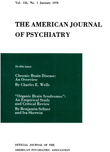COMPARATIVE LYMPHOCYTIC AND BIOCHEMICAL RESPONSES OF PATIENTS WITH SCHIZOPHRENIA AND AFFECTIVE DISORDERS TO ELECTROSHOCK, INSULIN SHOCK, AND EPINEPHRINE
Abstract
The effect of epinephrine on the circulating white blood cells in normal and psychotic (schizophrenic and manic-depressive) subjects are shown to be similar and approximate the effects obtained on psychotic subjects after electroshock treatment. Insulin also produced a lymphocytopenia but changes occurred more slowly and were of longer duration.
Investigation of plasma proteins and hemoglobin showed no significant differences in changes following epinephrine injection. After electroshock there was an immediate increase in serum proteins and hemoglobin with a return to preshock amounts in ½ to 1 hour. The lymphocytopenia occurred later and could not therefore be accounted for by hemodilution.
It is concluded that the circulating lymphocytes in psychotic subjects respond to epinephrine in the same way as do the controls. Furthermore, electroshock and insulin coma produce a lymphocyte response similar to that following epinephrine. These data do not support the contention that there is a disorder of pituitary-adrenal function in psychotic patients. On the other hand, apparently stressful psychologic disturbances in psychotic patients are not accompanied by lymphocytopenia or hyperglycemia. In this respect they differ from normal subjects. It is suggested therefore that there is a defect in psychotic patients which obstructs communication between the central nervous system and the endocrine system.
Access content
To read the fulltext, please use one of the options below to sign in or purchase access.- Personal login
- Institutional Login
- Sign in via OpenAthens
- Register for access
-
Please login/register if you wish to pair your device and check access availability.
Not a subscriber?
PsychiatryOnline subscription options offer access to the DSM-5 library, books, journals, CME, and patient resources. This all-in-one virtual library provides psychiatrists and mental health professionals with key resources for diagnosis, treatment, research, and professional development.
Need more help? PsychiatryOnline Customer Service may be reached by emailing [email protected] or by calling 800-368-5777 (in the U.S.) or 703-907-7322 (outside the U.S.).



